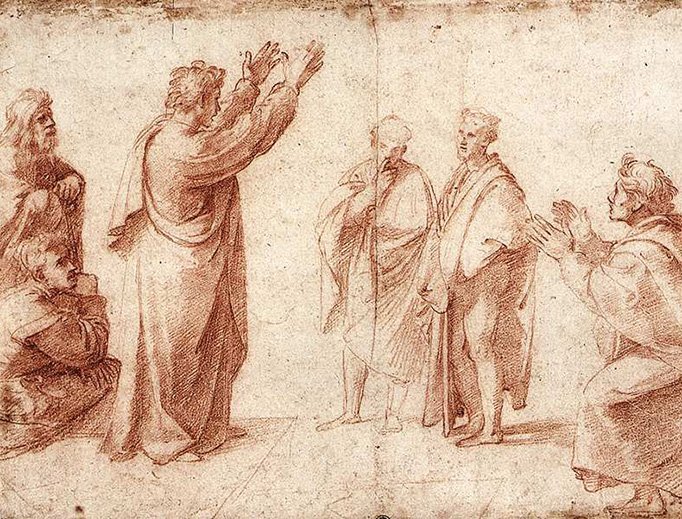The Genealogies of Modernity Journal
The Angel in the Top-Hat
This case illustrates the complex entanglement of enchantment and disenchantment in the 19th century, a dynamic participated in by Church and State, physicians and spiritualists—and angels in top-hats, too.
Richard Yoder on an angelic apparition
What Were the Women Up To?
While Benjamin Lipscomb cannot be criticized for failing to say everything relevant on this history, it is worth noting that there may be a richer and longer history to be told here.
Nicholas Sparks reviews The Women Are Up to Something
Jansenist Orientalism
Jansenist Orientalism, a sub-species of ‘Catholic Orientalism,’ matters as a French tributary to religious modernity as such—the overlooked contribution of a prominent if persecuted minority.
Richard Yoder on Orientalism in early modernity
Augustine, Violence, and the Novelty of Machiavelli
Machiavelli follows Augustine by demythologizing violence, stripping it of the gloss of legend and heroism. He departs from him by adding that it is necessary, excusable, and worthy of imitation.
Brian Harding on violence and political reality
Spiritual Abuse and Orthodox Disavowal
Perhaps the task of history, so like that of the Gospel, is to disquiet the living with a persistent presence that rises from the dead.
Richard Yoder reflects on Jansenism and the Refusal of Sacraments controversy
Deferring the End
Religion, and the apocalyptic motifs of the Christian Gospels, is that which alone can send us back into the world with a renewed strength for political engagement and activism.
Tim Howles on the eschatological roots of political renewal
Holding Open the Present
When the concept of the katechon is handled by contemporary theorists, it takes on a disappointingly conservative hue. . . . There seems to be little room for political activisms that might challenge the status quo.
Tim Howles on the eschaton and political theology
A Genealogy of Death
The happy skeletons smile, as if to say, “I am alive, I am well, and death is not the end.” For Jorge Portilla, like Socrates before him, a good and meaningful life requires the endorsement of life after death.
Brian Harding on philosophies of death from Greece to Mexico
The Sacredness of the Person
Only a dialectical approach between the Enlightenment and Christianity is capable of grasping the historical dynamics of the emergence of human rights within the European context.
Sharon Kuruvilla reviews Hans Joas’s The Sacredness of the Person
An Essential Romantic: On Dorothea Veit-Schlegel
Dorothea Veit-Schlegel shared some commitments with male Romantics, but she critiqued many of their central ideas, especially in relation to gender, education, and personal development.
Anna Ezekiel recovers an essential Romantic thinker and writer
The Extraordinary Marie Magdeleine Davy
Despite their imperfections, mystical texts are worth keeping alive in modernity—particularly in periods of authoritarianisms and violence—because they offer glimpses of other possibilities.
Brenna Moore on the life and work of a great figure of the Ressourcement
A Counter-Modern Intellectual Life
That Sertillanges finds these practical matters necessary for someone to live a properly intellectual life reveals a key insight: the intellectual is a human being, and a human being is more than just a spiritual soul.
Brs. Christopher Daniel and John Henry Peters on the intellectual vocation in the modern world
Theological Genealogy and the Undoing of Knots
The intended use of problematization is to recognize knots in order to be able to undo them. The undoing of the knots is beyond the scope of problematization, beyond the scope of scholarship.
Ryan McDermott considers theological genealogies of modernity
Keeping Tradition Alive
The arduous, the precarious measure of a tradition’s renewal is the measure of our own lives, in our own responses to the one thing necessary. It is we ourselves who look back, and it is we who look forward.
Anne Carpenter on living tradition in Charles Péguy and Maurice Blondel
The Impossibility of Ressourcement
Tradition can be renewed by being re-sourced. What a wonder, and what a wonderful idea. Isn’t it? But let me tell you my problem. As much as I like the idea of ressourcement, it is impossible.
Anne M. Carpenter on Maurice Blondel and Charles Peguy
Breaking Out of the Octopus Trap of Modernity
Our “doing” seems to be free from the static social narrative of the grand “to be” of the past. Instead, it is entrapping us in the ever-smaller understandings of “to be,” as if each of them were the grand narrative.
Takeshi Morisato on being and doing within Japanese modernity
God’s Grandeur in the (Not Entirely) Immanent Frame
Clogged porosity may be more prevalent in modernity. But there are “passageways between the immanent and transcendent realms,” places where grandeur flames through the frame.
Steven Knepper reviews Ryan Duns’s Spiritual Exercises for a Secular Age: Desmond and the Quest for God
Japan and the Octopus Trap of Modernity
What we see in Japanese modernity, according to Maruyama, is a national franchise of these “idols of the market place” through the continuous specialization and internal diversifications that multiply these groups.
Takeshi Morisato on how Japan became trapped in a hyper-specialized version of modernity
What Foucault Meant When He Said “Genealogy”
Problematization is just the beginning. Genealogy is what we do after we problematize. Genealogy can be more constructive than critical.
Ryan McDermott on Foucault and genealogy as comedy
Su Xuelin’s Catholic Vision of Modern China
Su Xuelin's novel Thorny Heart is a reminder of the freedom with which different Chinese communities decided what could be counted as “modern” or as “traditional.”
Gina Elia examines the relations of modernity, religion, and tradition in early 20th Century China























